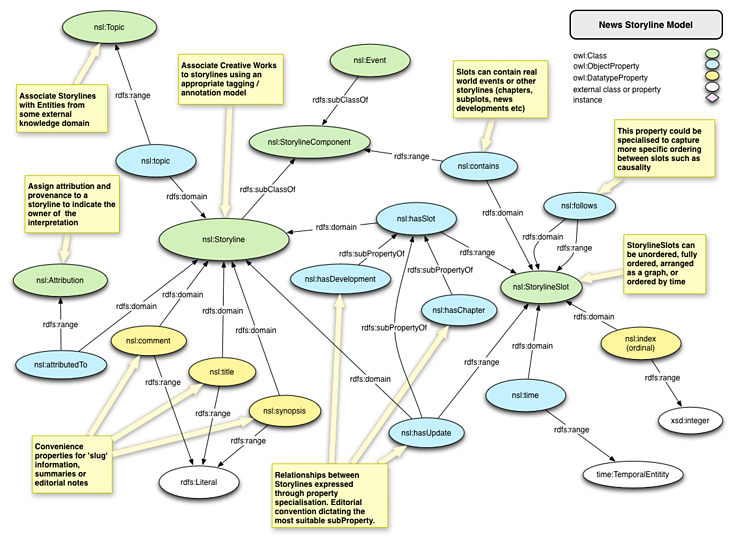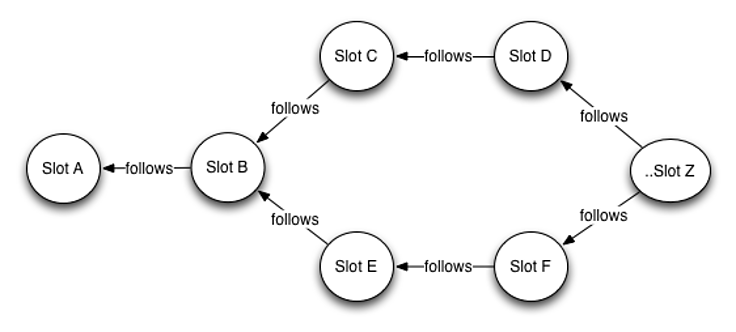| Authors | , /blogs/internet/authors/Jeremy_Tarling, |
| Contributors | Paul Rissen, Helen Lippell, Matt Chadburn, Tom Leitch, Dan Brickley, Michael Smethurst, Sebastien Cevey |
| Created Date | 2013-05-01 |
| Version | 0.3 |
| Licence | |
| Download | RDF |
This ontology has been created in collaboration with The Guardian, Press Association, and OntoBa.
Introduction
The News Storyline Ontology is a generic model for describing and organising the stories news organisations tell. The ontology is intended to be flexible to support any given news or media publisher's approach to handling news stories. At the heart of the ontology, is the concept of Storyline. As a nuance of the English language the word 'story' has multiple meanings. In news organisations, a story can be an individual piece of content, such as an article or news report. It can also be the editorial view on events occurring in the world.
The journalist pulls together information, facts, opinion, quotes, and data to explain the significance of world events and their context to create a narrative. The event is an award being received; the story is the triumph over adversity and personal tragedy of the victor leading up to receiving the reward (and the inevitable fall from grace due to drugs and sexual peccadillos). Or, the event is a bombing outside a building; the story is an escalating civil war or a gas mains fault due to cost cutting. To avoid this confusion, the term Storyline has been used to remove the ambiguity between the piece of creative work (the written article) and the editorial perspective on events.

A Storyline in its most basic form can be an individual, but typically would consist of a richer collection of storyline components. These components exist in slots that can be fully ordered using an index property, ordered temporally, or arranged in a graph to possibly express parallel running developments.

Storyline components can be indisputable real world events, or other storylines (chapters, sub-plots, updates, news developments etc). Storylines can be associated with Topics in some knowledge domain (eg people, places, organisations).
As news stories are typically of a subjective nature (one news publisher's interpretation of any given news story may be different from another's), Storylines can be attributed to some agent to provide this provenance.
The implementation of the Attribution, Topic, and Event classes has been purposely left open so the storyline ontology can be flexibly integrated into existing wider publishing domain models without assumption.
Ontology Terms
Automatically generated documentation for the ontology terms.
Classes
| Attribution | |
|---|---|
| URI | |
| Description | Attribution of a storyline used for attributing the interpretation of the storyline to some agent. An interface class, that doesn't restrict the implementation of an attribution. |
| Properties | attributedTo |
| Event | |
|---|---|
| URI | |
| Description | A newsworthy event. An un-disputable real world event. |
| Superclasses | StorylineComponent |
| Storyline | |
|---|---|
| URI | |
| Description | A news storyline. |
| Superclasses | StorylineComponent |
| Properties | attributedTo, hasChapter, hasDevelopment, hasSlot, hasUpdate, synopsis, topic |
| StorylineComponent | |
|---|---|
| URI | |
| Description | An abstract parent class of storyline components. |
| Subclasses | Event, Storyline |
| Properties | contains, dateCreated |
| StorylineSlot | |
|---|---|
| URI | |
| Description | A storyline slot, used as a container for storyline components. |
| Properties | contains, follows, hasChapter, hasDevelopment, hasSlot, hasUpdate, index, time |
| Topic | |
|---|---|
| URI | |
| Description | The topic of a storyline. An interface to some concept in a knowledge domain. |
| Properties | topic |
Properties
| attributedTo | |
|---|---|
| URI | |
| Description | Associates a storyline to its attribution. Provides for interpretation provenance through attribution |
| Domain | Storyline |
| Range | Attribution |
| contains | |
|---|---|
| URI | s |
| Description | Associates a Slot to a StorylineComponent contained therein. Can be a news event or another storyline |
| Domain | StorylineSlot |
| Range | StorylineComponent |
| dateCreated | |
|---|---|
| URI | |
| Description | The date a storyline was created |
| Domain | StorylineComponent |
| Range |
| follows | |
|---|---|
| URI | |
| Description | Allows one or more slots to be sequenced. Slot A follows Slot B. |
| Domain | StorylineSlot |
| Range | StorylineSlot |
| hasChapter | |
|---|---|
| URI | |
| Description | Associates a slot to a storyline as a chapter of an existing storyline. |
| Superproperties | hasSlot |
| Domain | Storyline |
| Range | StorylineSlot |
| hasDevelopment | |
|---|---|
| URI | |
| Description | Associates a slot to a storyline as a development of an existing storyline. |
| Superproperties | hasSlot |
| Domain | Storyline |
| Range | StorylineSlot |
| hasSlot | |
|---|---|
| URI | |
| Description | Associates a slot to a storyline. A storyline can have many slots |
| Subproperty | hasChapter, hasDevelopment, hasUpdate |
| Domain | Storyline |
| Range | StorylineSlot |
| hasUpdate | |
|---|---|
| URI | |
| Description | Associates a slot to a storyline as an update to an existing storyline. |
| Superproperties | hasSlot |
| Domain | Storyline |
| Range | StorylineSlot |
| index | |
|---|---|
| URI | |
| Description | A slot index. Allows slots to be ordered numerically |
| Domain | StorylineSlot |
| Range |
| synopsis | |
|---|---|
| URI | |
| Description | The synopsis of a storyline |
| Domain | Storyline |
| Range |
| time | |
|---|---|
| URI | |
| Description | The time of a slot. A Temporal entity, an interval. Allows slots to be ordered temporally. |
| Domain | StorylineSlot |
| Range |